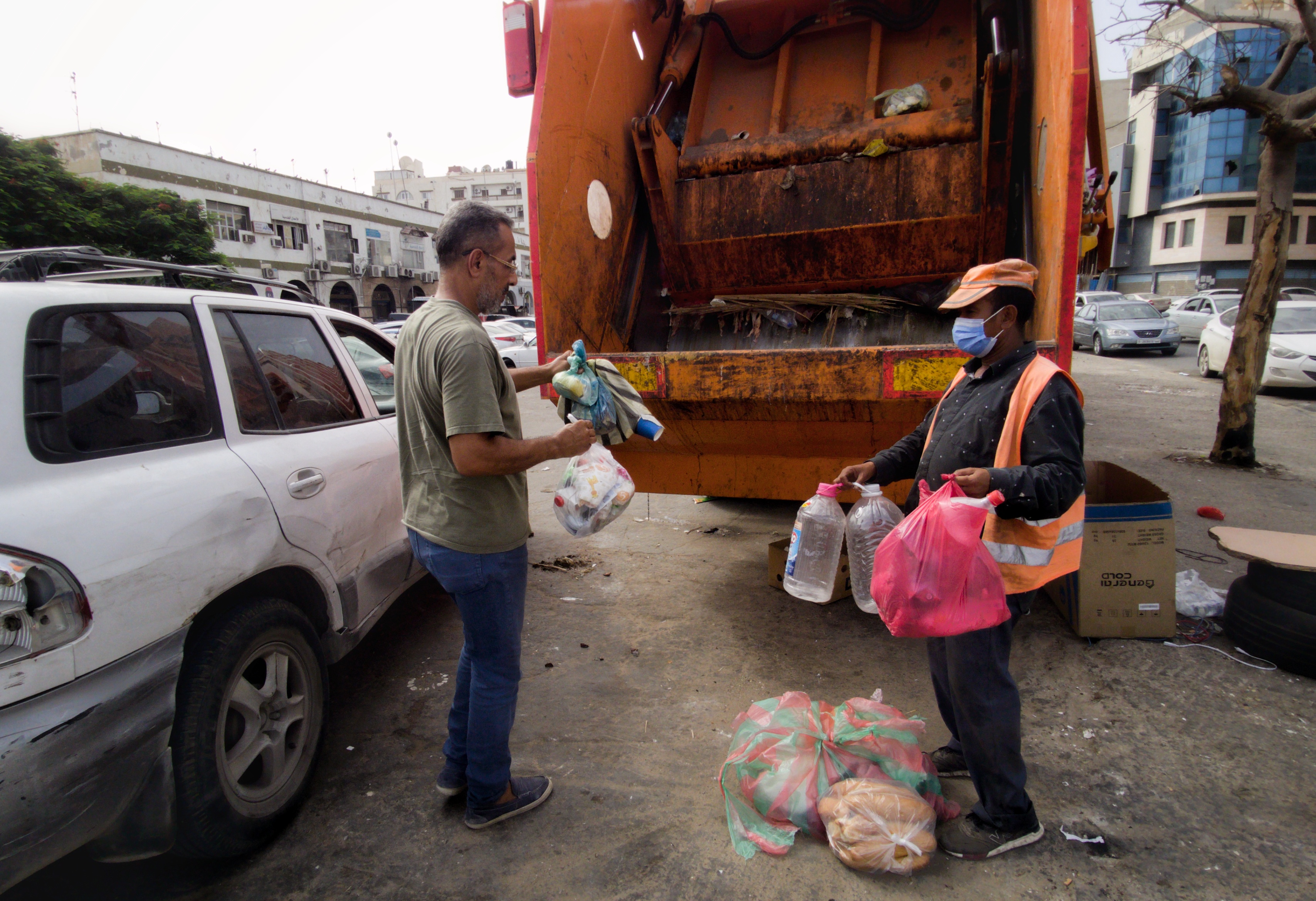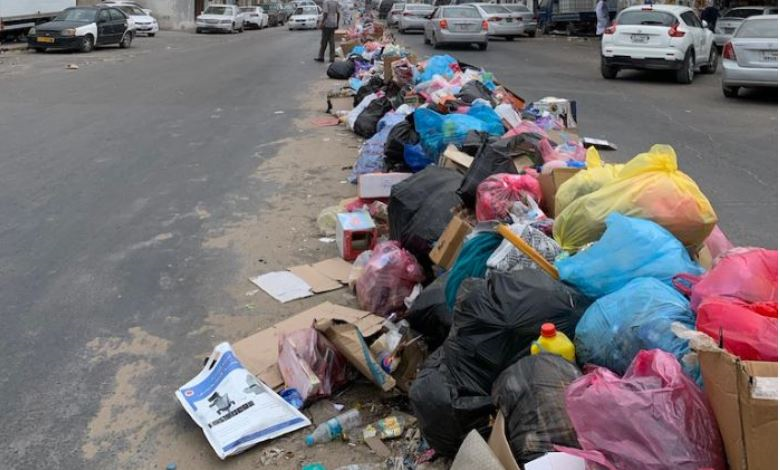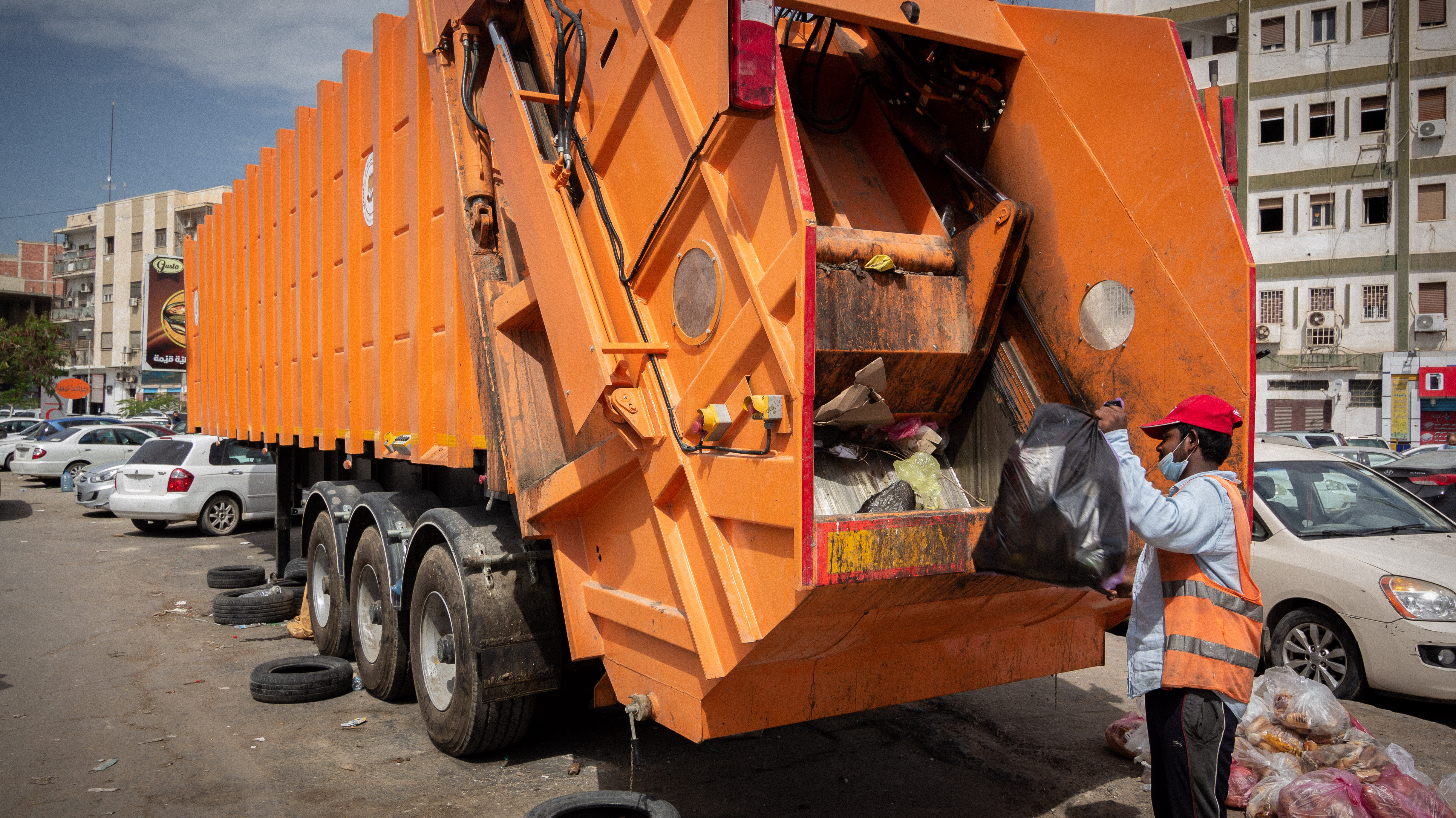Mr Husam Alsabai brings garbage to one of the collecting points in Tripoli center. Photo: ©UNDP Libya/ Malek Elmaghrebi
"The routine of disposing the household waste was tiring. What was more tiring and nonsense was that sometimes I had to go to another municipality to dispose of the rubbish there," states Mr. Husam Alsabai, a resident of Tripoli Center Municipality, who is 40 years old and father of five children.
During the past years, Husam experienced challenges to dispose of his household waste. Sometimes, he was putting the garbage in different designated places close to his neighborhood, but other times, he could not find those designated places. Therefore, he had either to keep it in the house for a long time or to travel a long distance to get rid of it.
Due to the overpopulation in the municipalities of Greater Tripoli as well as the fact that some areas were blocked by the conflict, waste collection and disposal was a challenge for local authorities. The streets have been witnessing an unimaginably large accumulation of waste for a long time. The amount of waste generated was a detriment to residents’ public health and could be a source of epidemics that may cost lives. According to WHO, in the long term, one can develop diseases such as asthma, birth defects, cancer, cardiovascular disease, childhood cancer, chronic obstructive pulmonary disease, infectious diseases, low birth weight, and pre-term delivery. Bacteria, vermin and insects can also be added to the problem that trash causes.
Accumulation of garbage in streets of Tripoli in March 2019. Photo: ©UNDP Libya
Between anger and despair
"At a certain point, we came to believe that there were no responsible authorities in charge of garbage disposal, taking into account that the accumulated garbage was in the streets for a long time, emitting very strong, bad smells, without mentioning the unpleasant view," Husam explains.
The General Company for cleaning services is the only body responsible for collecting and disposing of refuse within cities. Among the reasons that led to the accumulation of waste in the streets were labour strikes and the company's inability to provide maintenance of worn-out equipment.
Joining efforts for a cleaner environment
"Although garbage collection is not part of our mandate, we offer support to the Company with available means to contribute to solving this challenge. We recently activated the Cleaning Services Unit in the municipality and allocated better assets and a sound plan," says Mr. Nasser Al-Krio, member of Tripoli Center Municipal Council.
Led by national and municipal Libyan institutions, and implemented by the United Nations Development Programme (UNDP) with support from 13 international partners and the Government of Libya, the Stabilization Facility for Libya (SFL) provides quick rehabilitation of critical infrastructure and delivers equipment to help local authorities across the country to improve basic services for the people.
Providing such basic, vital services such as garbage disposal is key for local authorities to meet the needs of people and it contributes to peace among communities, allowing people to look ahead with greater security, dignity and opportunities.
The SFL delivered 28 refuse semi-trailers and seven tractor heads to six municipalities in Greater Tripoli, namely Tajoura, Tripoli Center, Abu Salim, Souq Al Jomoa, Ain Zara and Hay Andalous. It also provided four refuse collectors and one tractor head to Tripoli Center Municipality.
Because of the support, the Tripoli Center Municipality uses the equipment as part of its plan to manage the waste. The equipment effectively contributes to keep the city streets clean.
A worker from the Cleaning Services Unit in Tripoli Center Municipality is disposing garbage in one of the semi-trailers delivered by UNDP’s Stabilization Facility for Libya. Photo: ©UNDP Libya/ Malek Elmaghrebi
"We started using these semi-trailers in July 2020. We use them as a temporary landfill. They have a capacity of 50 tons each and are performing well," declares Mr. Sami Ben Moussa, Head of the Cleaning Services Unit in Tripoli Center Municipality. "With the equipment we have been able to collect almost half of the overall garbage volume in the municipality. This is a great support that eases the stress on the existing trucks. We distributed three of the refuse collectors to the most overcrowded places: Dahra, Souk Altholatha, and Zawiya Street, to be waste collecting points, while the fourth one is used as a mobile truck," he adds.
Residents in Greater Tripoli can now dispose household garbage comfortably as they are informed of the collecting points within each neighborhood.
"The new equipment and support provided, do not only contribute to address the solid waste collection challenge in the municipality, but also make possible to consider implementing more developed projects such as sorting the waste, a goal that is not easy to achieve," points out Ms. Sarah Nami, Tripoli Center Municipality Deputy and expert in solid waste management.
Ms. Sarah Nami is signing on a document in Tripoli Center Municipality. Photo: ©UNDP Libya/ Malek Elmaghrebi
Tripoli Center is getting clean again
"I now routinely carry the waste to the collection point on my way to work. I am feeling so much better as I do not have to go to a distant place to dispose of my garbage. The situation has been improving for the last two months. Streets are clean now," says Husam proudly.
"Sometimes, we are seeing random accumulation of rubbish in the neighborhood. However, volunteers collect and clean the waste, and raise people’s awareness to collect and put the garbage in sites designed by the municipality," he explains.
"We thank the SFL, UNDP and all who contributed to the delivery of these equipment, " says Nasser.
The Municipality can now consider undertaking further steps towards addressing the waste challenge, " he concludes.
A view of Tripoli center by night. Photo: ©UNDP Libya/ Malek Elmaghrebi

 Locations
Locations







